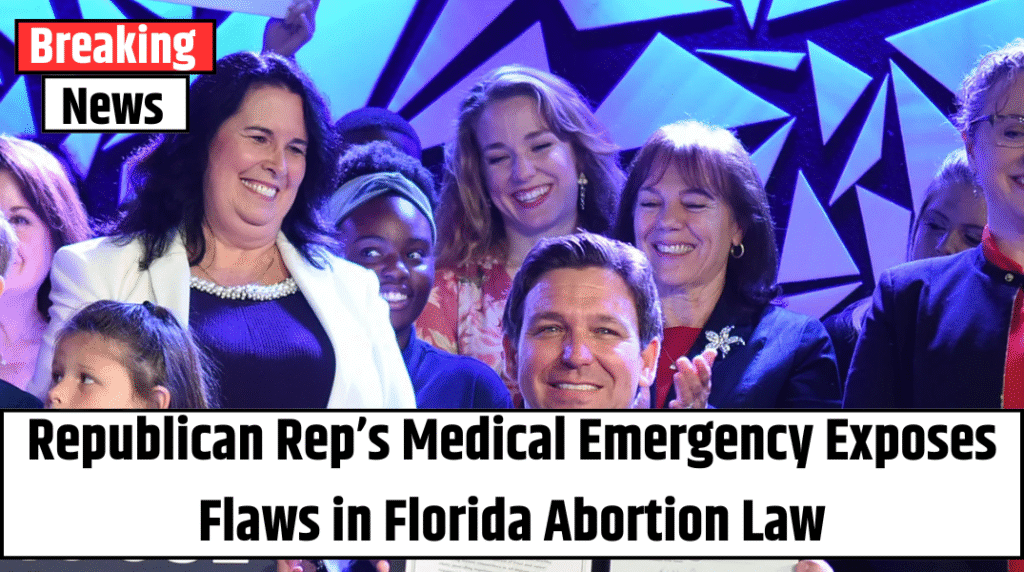WASHINGTON, D.C. — Florida Republican Congresswoman Kat Cammack is shedding light on her harrowing medical experience involving an ectopic pregnancy, highlighting the confusion and fear among healthcare workers in states with strict abortion laws. She says her life-saving treatment was delayed due to misunderstandings fueled by political messaging surrounding Florida’s six-week abortion ban.
In May 2024, Cammack was five weeks into a nonviable ectopic pregnancy — a condition where the fertilized egg implants outside the uterus, posing serious risks to the mother. Although medical staff determined she needed methotrexate, a drug used to safely end such pregnancies, they hesitated to administer it due to the state’s newly enacted abortion restrictions.
A Crisis in the ER
As Cammack’s condition became increasingly urgent, she found herself trying to reassure doctors that they weren’t violating the law. She even resorted to researching Florida’s abortion statute on her phone and attempted to contact the governor’s office for clarification. After several tense hours, physicians agreed to proceed with treatment — but the delay left a lasting impact.
Despite her own pro-life stance and role as co-chair of the House Pro-Life Caucus, Cammack said the incident revealed how mixed messages from advocacy groups and vague legal language can paralyze medical professionals in life-threatening situations.
“It was absolute fearmongering at its worst,” she told The Wall Street Journal. “Doctors shouldn’t have to hesitate in an emergency.”
Also Read – Visa Delays Leave International Doctors in Limbo Ahead of U.S. Residencies
Legal Ambiguities Add to Confusion
Florida’s six-week abortion ban — among the most restrictive in the U.S. — took effect on May 1, 2024. It prohibits most abortions after six weeks of pregnancy, before many people even realize they are pregnant. While ectopic pregnancies are technically exempt from the ban, legal experts point out that the law does not clearly define the condition or how it should be treated.
“The law fails to explicitly outline ectopic pregnancies,” said Molly Duane, an attorney with the Center for Reproductive Rights, noting that such ambiguity can lead to dangerous delays in care.
Doctors, particularly in states with strict abortion laws, have expressed concern over the legal repercussions of their medical decisions. Alison Haddock, president of the American College of Emergency Physicians, emphasized that treatment in early pregnancy is a “medically complicated space”, and that many ER doctors fear legal consequences, even when performing standard procedures.
Political Messaging or Policy Problem?
Cammack believes that pro-choice advocacy groups have contributed to the confusion through overstated claims, causing healthcare professionals to fear prosecution for procedures that are still legally permitted.
“There will be comments like, ‘Thank God for abortion services,’ even though what I went through wasn’t an abortion,” she said, acknowledging the political divide over reproductive rights.
Abortion rights advocates, however, argue that the law’s lack of clarity, not messaging, is the real problem. They say Cammack’s ordeal is exactly the type of scenario they warned about — where restrictive abortion laws delay urgent care, even in non-abortion cases like ectopic pregnancies.
Seeking Common Ground
Cammack, now expecting another child, says her traumatic experience has prompted her to reflect on how both sides of the abortion debate might work together on issues of emergency maternal healthcare.
“I would stand with any woman — Republican or Democrat — and fight for them to be able to get care in a situation where they are experiencing a miscarriage or an ectopic pregnancy,” she said.
In response to growing confusion, Florida’s healthcare agency later issued official guidance clarifying that abortion is permitted when a pregnant person’s life or health is at risk. However, critics say the guidance came too late for many doctors — and patients — caught in the legal limbo created by the ban.



